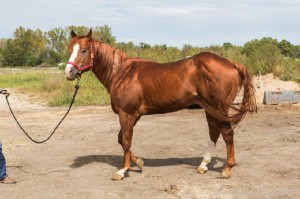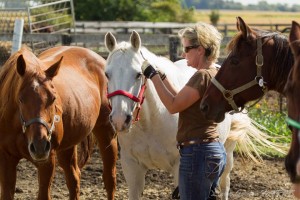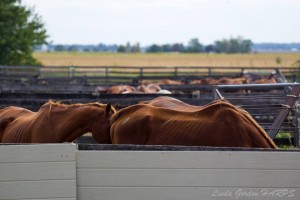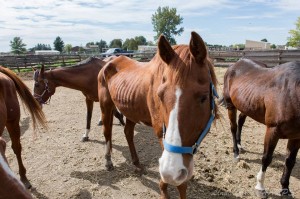Latest Update on Bingham Herd of 75 Quarter Horses in Desperate Need of Homes
By: Brittany Bevis
Last week, we informed our readers about a developing story involving a herd of 75 Quarter Horses that were in desperate need of being re-homed after their elderly owner fell on hard times. Today, we had the opportunity to speak with Donna Ewing, founder and president of Hooved Animal Rescue and Protection (HARPS), to receive an update on the status of this case.
Currently, 25 of the 75 animals have been re-homed. Time is of the essence when it comes to placing the remaining horses, because the cost to care for a herd of this magnitude well exceeds $30,000. HARPS has partnered with Hands & Hooves Rescue of Chicago, IL. to share the workload and financial strain.
“We have about 100 applications for the horses that we are going through right now,” Ewing says. “Most of these animals are going to be companion horses, because they are older broodmares anywhere from 17-22 years of age.”
“These horses aren’t broke to ride. Most are halter horses, so it will take special people to give them special homes. We’re thrilled with the outpouring of support from the Quarter Horse people and horse people in general across the United States and even Canada. It’s heartwarming to see how many people care. Right now, we’re going to spend Saturday and Sunday going through applications and trying to re-home as many as we can.”
At the present time, Ewing believes she may need to stop accepting applications, simply in order to process the ones they already have, in a time-effective manner. However, she stresses that people should continue to go to the HARPSonline.org website for further updates in the coming weeks, because it is likely many of the horses will still be left.
“It’s just a matter of time before we know how many horses will be left after we go through this first set of applications,” she says. “There still may be many more left next week. We’re very short-staffed, and it’s quite overwhelming, but wonderful, quite frankly to see how much people really care.”
Because HARPS is taking the lead on this particularly large case, they have a number of horses on their waiting list to be accepted for re-homing and adoption.
“We hope we don’t receive something of this magnitude again,” she says. “Right now, we have 8-10 people on hold who are trying to send us horses. They’re standing in the wings looking for homes for their horses, because they don’t want to send their horses to slaughter. The main problem is we don’t have enough room.”
As the story of the Bingham herd as quickly circulated throughout various news outlets, Ewing would like to stress a few important points. First, many of these animals are older halter-bred horses that are not broke to ride and, as such, would be suitable as good companion animals.
“Quarter Horses are the Labradors of the horse world. They are so kind and smart. They are great animals for first time horse owners. ”
Secondly, Ewing encourages the public to have compassion, not only for the animals involved in this case, but the humans as well. Richard Bingham was an AQHA President in 1994, was inducted into the AQHA Hall of Fame in 2003, and passed away in 2010. For many years, the Bingham family resided on their farm in Illinois where they bred, raised, and fit World Champions and Futurity winners. Sadly, after both Richard and daughter Kim passed away, wife Karen was left with the care of a very large herd of horses.
“[Vilifying the owner] is not what we’re about,” she says. “We’re a humane society, not an anti-humane society. I feel people can still have compassion for her, because she became sentimentally attached to these animals. Of course, some degree of blame is to be placed, but she was definitely attached to these animals and wasn’t being realistic about the incredible amount of money it would take to feed all of them.”
“They couldn’t have landed in better hands. I knew both Karen and her husband. They have been members of our humane society for many years, so I feel I have a direct connection to this somewhat. Personally, I took her daughter’s favorite horse named Magic who is 32 years old and extremely swaybacked. He’s shiny, happy, sweet, and sound, a little arthritic, but no worse for wear. Still, nobody would have wanted him, so I took him. He’s in heaven right now. He has a double box stall that leads out to a quarter of an acre pasture. Now, he goes out into the sun and talks to the other horses. He’s happy, and I’m really happy I could do that for Karen, because she was very attached to that horse.”
“You can’t have compassion for animals and not have compassion for humans as well. She was in a very difficult situation.”
If you would like more information about how to help, visit HARPSonline.org. Just to gain a little perspective, here is how donations can be used to help these horses.
$20,000- two months of hay for 75 horses
Donation of:
$5 = Feed one horse for one day
$20 = De-worm one horse
$40 = Farrier services
$50 = Vaccinations
$100 = Dental Work














